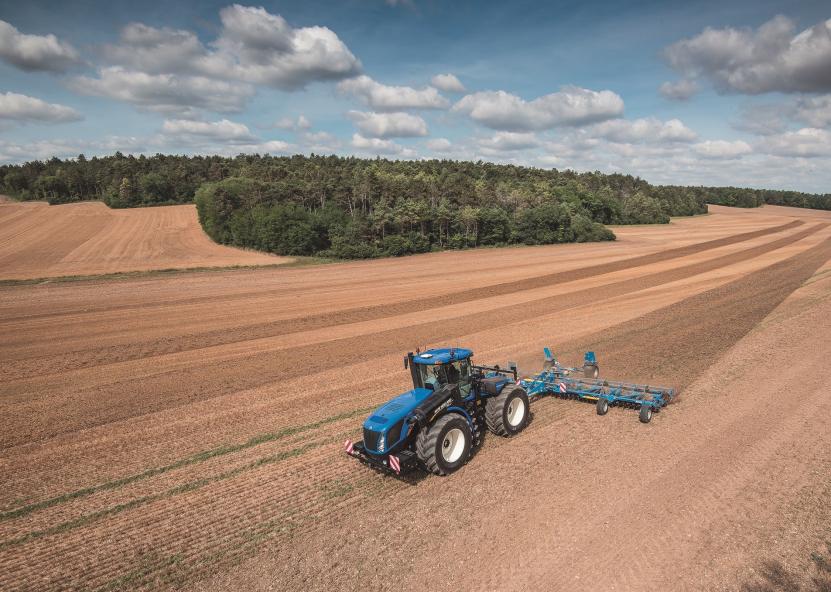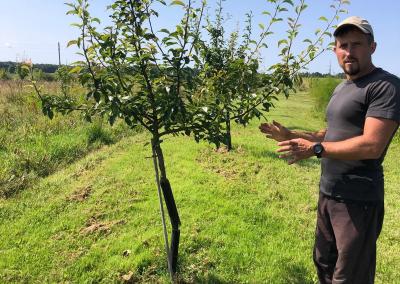NMA miscalculates - €20 million gap in financial support
Evening rumours spread in the farming community that there is no money left for the measure "Investments in agricultural holdings" and the National Paying Agency (NPA) is asking to postpone payments.
It is said that there is a shortfall of around €20 million. Why and how did this financial gap appear and, more importantly, what can be done to plug it and protect farmers from default?
LGAA President Audrius Vanagas: flawed practice
„It's like airlines that sell more tickets than there are seats because they expect somebody not to come. It is the same with donations in this case. This is done in order to avoid having to pay the money back to Brussels. We have repeatedly criticised this," says A. Vanagas, chairman of the Lithuanian Cereal Growers Association, adding that this situation is not new in principle, and that there is often a shortage of funds for aid payments, but what is unusual in this case is that the shortage is very large.
„In the past, the Minister of Agriculture used to coordinate with the Minister of Finance to find money from the National Budget“, says the chairman of the LGAA about how similar problems were solved.„These situations show that support for investments, and especially those related to construction, needs to be planned and measures need to be launched as early as possible at the beginning of the new period. There are many nuances – it takes time to get building permits etc. The time from the idea to the act of completion is very short. All this piles up and you end up with a situation that is really bad," concludes Mr Vanagas.
LUU Pakruojis district branch chairman Gedas Špakauskas: poor communication
„A number of farmers have contacted us with an almost desperate request for help, because they have received information from the NMA that there are no funds or they will be paid much later“, – says G. Špakauskas.
„The machinery has been bought, the projects have been implemented, but the farmer still owes money to the supplier – to the machinery or construction company. And I imagine that they have been pressuring farmers about when the money will be available, and now suddenly they find out that it won't be available or it will be severely delayed," says Špakauskas.
The chairman of the Pakruojis district branch of the UFA says it has not been an easy year anyway, and such news can be disconcerting.
„I'm pretty sure that construction or machinery suppliers can even go to court now. It doesn't matter to them whether the project was implemented with or without support, the most important thing is to be paid for it," Špakauskas echoes the farmers' fears.
„The NMA probably didn't find out just yesterday, they probably saw the situation before. Of course, one cannot just blindly blame the NMA – they wanted to arrange the finances in such a way that they would not have to pay a single euro back to the EU budget because the period had expired. But the financial set-up was a failure. However, this situation should have been communicated earlier and from a higher level, not by telling the NMA specialists to call farmers. This was a poor decision," emphasises the chairman of the LŪS Pakruojis district branch, reassuring that he is not being left behind.
„Today the LŪS chairman is meeting with the Minister of Agriculture in Kretinga, NMA representatives will be present and will try to find solutions“, – explains G. Špakauskas.
Former Minister of Agriculture Ignas Hofmanas: the problem can be solved
„First you can redistribute money from other support measures – then that money is redistributed and overlapped. The other way – the Ministry of Finance should come to an agreement with the Ministry of Agriculture and the two should find solutions together“, – former Minister of Agriculture I. Hofmanas tells how the situation could be solved.
„I also had a similar situation. But together with the then Minister of Finance R. Šadžiņš, we found a solution – we found the funds and disbursed them“, – I. Hofmanas shares his personal experience and adds that such problems arise when the demand exceeds the planned demand and a shortage of funds arises.„But it is a solvable problem“, – says the former Minister. Asked whether he had not been warned of a possible shortfall of €20 million when he was still in office, he assures that the budget had been drawn up and had included as much money as was needed.Erikas Bėrontas, President of the Lithuanian Association of Agricultural Machinery: a mistake has been made and needs to be addressed
Erik Bėrontas, former head of the NMA, says a mistake may have been made and the state now needs to correct it. According to the President of the Lithuanian Agricultural Machinery Association, there are two ways to solve this problem.
„The government allocates EUR 20 million from the budget, a notification document is created and the EC is asked to allocate an additional EUR 20 million. The other way is to wait for 1 January and use the funds from the new SP (Strategic Plan) programme. The regulation allows this, i.e. if there is a balance of unpaid QIPs from 2014-2020, it is possible to use the SP funds for 2023-2027," says Mr Bėrontas.
„I would like Lithuania to go down the first path – €20 million would be allocated from the budget, notified to the EC, the money would go to farmers, and the EC would no doubt notify it. Especially since it has not been an easy year, there have been many natural disasters, and besides, this does not happen every year, at the end of each programming period," the former head of the NMA reveals.He said that €20 million is a small amount of money in the national context, and by allocating this much to the agricultural sector, the Government would be proving that it is indeed sticking to its strategic objectives – just this year, the Parliament approved that agriculture – is one of the strategic directions.
„Waiting until the beginning of the year can be very troublesome in terms of payments to suppliers, contractors and so on. There will be losses and interest charges. If the MAF were willing to compensate for these losses, there might not be such a big uproar. Then everyone would know that everything will be reimbursed, they would re-sign the contracts and wait, – a solution is proposed by E. Bėrontas.














































































































